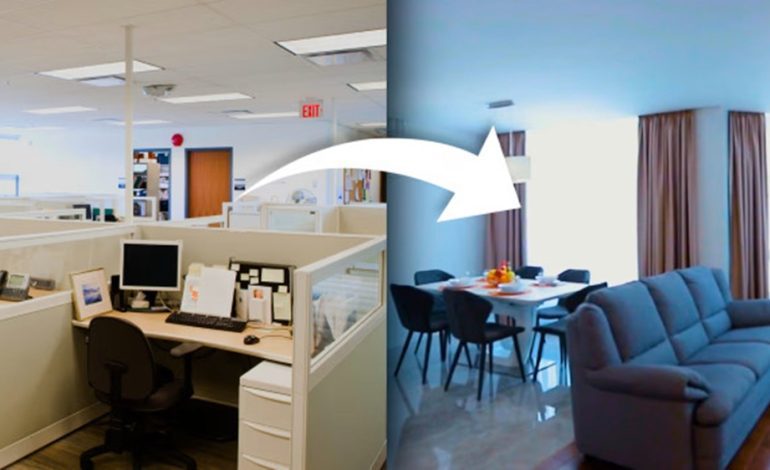Can Your Empty Office Space Be Turned Into Apartments?

Across cities worldwide, commercial office spaces are sitting empty as remote work becomes a permanent fixture for many businesses. With vacancies rising, developers, investors, and city planners are exploring a creative solution: turning empty offices into residential apartments. This trend not only revitalizes unused properties but also helps address housing shortages in urban areas. But is it feasible, and what does it take to transform office space into livable apartments?
Why Empty Offices Are Becoming a Problem
Several factors have contributed to the rise of empty office spaces:
Remote Work Shift
Companies are downsizing office footprints as employees continue working from home.
Economic Changes
Some businesses closed or consolidated, leaving buildings unoccupied.
High Maintenance Costs
Vacant offices still require utilities, security, and maintenance, making them costly for owners.
These vacant properties represent lost revenue for owners and can lead to urban blight if left unused.
SEO Keywords: empty office spaces, urban office vacancies, office to apartment conversion, commercial real estate trends
Benefits of Converting Offices to Apartments
Transforming office buildings into residential units comes with several advantages:
Alleviate Housing Shortages
Many cities face a shortage of affordable housing. Office-to-apartment conversions can create much-needed living space.
Revitalize Urban Areas
Occupied buildings attract businesses, shops, and services, boosting local economies.
Sustainable Development
Reusing existing structures reduces the need for new construction, making it an eco-friendly alternative.
Financial Incentives
Developers may benefit from tax credits, grants, or subsidies for urban redevelopment projects.
SEO Keywords: urban housing solutions, office conversion benefits, sustainable urban development, commercial to residential
Challenges in Office-to-Apartment Conversions
While the concept is appealing, there are several challenges to consider:
Structural Limitations
Office buildings may have layouts, floor heights, and window placements unsuited for residential units.
Building Codes and Regulations
Zoning laws, fire codes, and residential regulations can complicate conversions.
Cost of Renovation
Retrofitting offices with kitchens, bathrooms, and insulation can be expensive.
Market Demand
Developers must ensure there is demand for apartments in the area before investing.
SEO Keywords: office conversion challenges, building code office apartments, urban redevelopment costs, zoning regulations
Examples of Successful Conversions
Several cities have seen successful office-to-apartment transformations:
New York City: Midtown office towers converted into luxury apartments.
London: Empty commercial buildings repurposed into affordable housing units.
Chicago: Downtown office spaces transformed into modern apartments with mixed-use amenities.
These examples show that with careful planning, conversion is possible and profitable.
SEO Keywords: office to apartment case studies, urban redevelopment success, NYC office conversions, London housing projects
Steps to Convert an Office Building
For developers considering this strategy, here’s a typical roadmap:
Feasibility Study
Analyze structural integrity, zoning, and market demand.
Design Planning
Hire architects to reimagine layouts suitable for residential use.
Regulatory Approvals
Obtain permits for zoning changes, safety upgrades, and building compliance.
Construction and Renovation
Install kitchens, bathrooms, and proper insulation; update electrical and plumbing systems.
Marketing and Leasing
Position units for target residents, whether for luxury, family, or affordable housing markets.
SEO Keywords: converting offices to apartments, urban housing development, office renovation steps, residential conversion planning
Future Outlook
As remote work remains prevalent and urban housing demand continues to grow, office-to-apartment conversions are likely to increase. Cities with high office vacancies may find this approach both economically and socially beneficial, providing new housing options while revitalizing underused spaces.
Additionally, technology and innovative design solutions, such as modular construction and energy-efficient retrofits, are making conversions more practical and cost-effective.
SEO Keywords: future of office conversions, urban housing trends, adaptive reuse buildings, apartment development opportunities
Final Thoughts
Empty office buildings no longer need to be symbols of urban decline. With thoughtful planning, investment, and design, these spaces can be transformed into modern, functional apartments that meet the needs of today’s urban dwellers.
For building owners and city planners, the opportunity lies in seeing vacant offices not as liabilities, but as untapped potential. Converting them into apartments could solve housing shortages, rejuvenate neighborhoods, and provide financial returns for investors—all while creating vibrant, livable urban spaces.
SEO Keywords Recap: empty offices to apartments, urban redevelopment, adaptive reuse, residential conversions, office vacancy solutions









